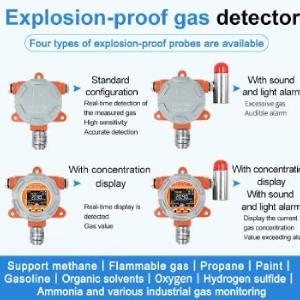Understand Fixed gas detector
Fixed gas detector are essential devices for ensuring the safety of workers and preventing potential hazards in various industries. These advanced detectors play a crucial role in monitoring and detecting the presence of harmful gases in confined spaces and industrial environments. With their reliable and continuous monitoring capabilities, fixed gas detectors provide early warnings, enabling prompt action to mitigate risks and protect lives.

Fixed gas detector utilize sophisticated sensing technologies to detect and measure the concentration of target gases in the surrounding atmosphere. These detectors can detect a wide range of hazardous gases, including flammable gases, toxic gases, and oxygen deficiency. By actively monitoring gas levels, these devices provide real-time data and trigger alarms when gas concentrations exceed safe thresholds.
Primary advantage of using fixed gas detector
The primary advantage of using fixed gas detectors is their ability to continuously monitor confined spaces and alert personnel in case of gas leaks or abnormal gas levels. This proactive approach ensures that workers are immediately informed of potential dangers, allowing them to evacuate the area or take appropriate safety measures. By providing early warnings, fixed gas detectors significantly reduce the risk of accidents, injuries, and even fatalities.

Furthermore, fixed gas detectors contribute to overall workplace safety by facilitating compliance with safety regulations and standards. In many industries, such as oil and gas, chemical, and manufacturing, the presence of hazardous gases is a significant concern. By installing fixed gas detectors, companies can demonstrate their commitment to employee safety and ensure compliance with regulatory requirements.
Fixed gas detectors also promote operational efficiency by helping identify potential sources of gas leaks or equipment malfunctions. By monitoring gas concentrations over time, these detectors can detect subtle changes or trends in gas levels, indicating potential issues with equipment or storage systems. This capability allows for preventive maintenance and timely repairs, minimizing downtime and optimizing productivity.
Moreover, the integration of fixed gas detectors with centralized monitoring and control systems enhances situational awareness and response capabilities. Real-time data from multiple detectors can be transmitted to a central monitoring station, enabling operators to quickly assess the situation, identify affected areas, and initiate appropriate emergency protocols. This streamlined approach improves the efficiency of emergency response and ensures a coordinated effort in managing gas-related incidents.
Fixed gas detectors are vital tools
In conclusion, fixed gas detectors are vital tools for maintaining a safe working environment in industries where hazardous gases are present. These detectors provide continuous monitoring, early warnings, and data-driven insights that enable prompt action and mitigate risks. By ensuring compliance, enhancing operational efficiency, and improving emergency response, fixed gas detectors play a significant role in safeguarding the well-being of workers and preventing potential disasters.
